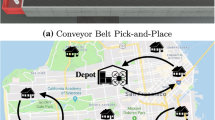Abstract
Task-based planning problems for multi-agent systems require multiple agents to find a joint plan for a constrained set of tasks. Typically, each agent receives a subset of tasks to complete. Due to task interdependencies, such task allocations induce interdependencies between agents as well. These interdependencies will prevent the agents from making a plan for their subset of tasks independently from each other, since the combination of such autonomously constructed plans will most probably result in conflicting plans. Therefore, a plan-coordination mechanism is needed to guarantee a conflict-free globally feasible plan.
In this paper, we first present a brief overview of the main results achieved on plan coordination for autonomous planning agents, distinguishing between problems associated with deciding whether a coordination mechanism is necessary, designing an arbitrary coordination mechanism, and designing an optimal (minimal) coordination mechanism. After finding out that designing an optimal coordination mechanism is difficult, we concentrate on an algorithm that is able to find a (non-trivial) coordination mechanism that is not always minimal. We then discuss some subclasses of plan-coordination instances where this algorithm performs very badly, but also some class of instances where a nearly optimal coordination mechanism is returned.
Hereafter, we discuss the price of autonomy as a measure to determine the loss of (global) performance of a system due to the use of a coordination mechanism, and we offer a case study on multi-modal transportation where a coordination mechanism can be designed that offers minimal restrictions and guarantee nearly optimal performance. We will also place the use of these coordination mechanisms in a more general perspective, claiming that they can be used to reuse existing (single) agent software in a complex multi-agent environment.
Finally, we briefly discuss some recent extensions of our coordination framework dealing with temporal planning aspects.
Preview
Unable to display preview. Download preview PDF.
Similar content being viewed by others
References
Shehory, O., Kraus, S.: Methods for task allocation via agent coalition formation. Artificial Intelligence 101, 165–200 (1998)
Zlot, R.M., Stentz, A.: Market-based multirobot coordination for complex tasks. In: International Journal of Robotics Research, Special Issue on the 4th Int. Conf. on Field and Service Robotics, vol. 25, pp. 73–101 (2006)
Christodoulou, G., Koutsoupias, E., Nanavati, A.: Coordination mechanisms. In: Díaz, J., Karhumäki, J., Lepistö, A., Sannella, D. (eds.) ICALP 2004. LNCS, vol. 3142, pp. 345–357. Springer, Heidelberg (2004)
Smith, S.F., Gallagher, A., Zimmerman, T., Barbulescu, L., Rubinstein, Z.: Distributed management of flexible times schedules. In: Proc. of the 6th Int. Joint Conf. on Autonomous Agents and Multi-Agent Systems (AAMAS), pp. 472–479 (2007)
Decker, K.S., Lesser, V.R.: Designing a family of coordination algorithms. In: Proc. of the 1st Int. Conf. on Multi-Agent Systems (ICMAS), San Francisco, CA, USA. AAAI Press, MIT Press (1995)
Cox, J.S., Durfee, E.H.: Efficient mechanisms for multiagent plan merging. In: Proc. of the 3rd Int. Joint Conf. on Autonomous Agents and Multi-Agent Systems (AAMAS), Washington, DC, USA, aug 2004, vol. 3, pp. 1342–1343. IEEE Computer Society, Los Alamitos (2004)
Sandhlom, T.W., Lesser, V.R.: Coalitions among computationally bounded agents. Artificial Intelligence 94, 99–137 (1997)
Walsh, W.E., Wellman, M.P.: A market protocol for decentralized task allocation and scheduling with hierarchical dependencies. In: Proc. of the 3rd Int. Conf. on Multi-Agent Systems (ICMAS), pp. 325–332. IEEE Computer Society Press, Los Alamitos (1999)
Gerkey, B.P., Matarić, M.J.: A formal analysis and taxonomy of task allocation in multi-robot systems. Journal of Robotics Research 23, 939–954 (2004)
Dias, M.B., Stentz, A.: Traderbots: A market-based approach for resource, role, and task allocation in multirobot coordination. Technical Report CMU-RI-TR-03-19, Robotics Institute, Carnegie Mellon University, Pittsburgh, PA, USA (2003)
Buzing, P.C., ter Mors, A.W., Valk, J.M., Witteveen, C.: Coordinating self-interested planning agents. Autonomous Agents and Multi-Agent Systems 12, 199–218 (2006)
Steenhuisen, J.R., Witteveen, C., ter Mors, A.W., Valk, J.M.: Framework and complexity results for coordinating non-cooperative planning agents. In: Fischer, K., Timm, I.J., André, E., Zhong, N. (eds.) MATES 2006. LNCS (LNAI), vol. 4196, pp. 98–109. Springer, Heidelberg (2006)
Garey, M.R., Johnson, D.S.: Computers and Intractability: A Guide to the Theory of NP-Completeness. W. H. Freeman and Company, San Fransisco (1979)
Kvarnström, J., Doherty, P.: TALplanner: A temporal logic based forward chaining planner. Annals of Mathematics and Artificial Intelligence 30, 119–169 (2000)
Long, D., Fox, M.: Efficient implementation of the plan graph in STAN. Journal of Artificial Intelligence Research 10, 87–115 (1999)
Bonet, B., Geffner, H.: Heuristic search planner 2.0. AI Magazine 22, 77–80 (2001)
Steenhuisen, J.R., Witteveen, C.: Plan coordination for durative tasks. In: Salido, M.A., Garrido, A., Bartak, R. (eds.) Proceedings of the Workshop on Constraint Satisfaction Techniques for Planning and Scheduling Problems (COPLAS), pp. 73–80 (2007)
Chetan, Y., Zhang, Y., Witteveen, C.: Performance of coordination mechanisms (published, 2008)
Author information
Authors and Affiliations
Editor information
Editors and Affiliations
Rights and permissions
Copyright information
© 2008 Springer-Verlag Berlin Heidelberg
About this paper
Cite this paper
Steenhuisen, J.R., Witteveen, C., Zhang, Y. (2008). Plan-Coordination Mechanisms and the Price of Autonomy. In: Sadri, F., Satoh, K. (eds) Computational Logic in Multi-Agent Systems. CLIMA 2007. Lecture Notes in Computer Science(), vol 5056. Springer, Berlin, Heidelberg. https://doi.org/10.1007/978-3-540-88833-8_1
Download citation
DOI: https://doi.org/10.1007/978-3-540-88833-8_1
Publisher Name: Springer, Berlin, Heidelberg
Print ISBN: 978-3-540-88832-1
Online ISBN: 978-3-540-88833-8
eBook Packages: Computer ScienceComputer Science (R0)




